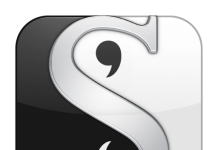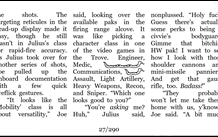 How easy is it to produce an ePub book—either your own or a public domain work—and spread it around the globe?
How easy is it to produce an ePub book—either your own or a public domain work—and spread it around the globe?
This topic is more than just grist for a post. I wanted to give the planet a quick preview of The Solomon Scandals in the standard IDPF format. And, if, along the way, people could also download Mobipocket and PDF versions of the three-chapter sample, not just ePub, then so much the better.
Easy to learn
Now, having tried the publishing tool at Feedbooks, I can say that it’s as easy to master as I’d hoped—at least if I want to stick to standard formatting. I’m unworried about frills in my case, even though ePub allows plenty for those who need them.
My Feedbooks file isn’t a heavily illustrated medical textbook, but rather an excerpt from a novel without photos.
The Stanza-iPhone connection
But I do want the sample from Scandals to be readable easily on an iPhone by way of Stanza, the most popular e-reading app for the iP and iPod Touch. Now, thanks to Feedbooks’ integration with Stanza, it is. Check it out for yourself.
Check it out for yourself.
From Stanza’s Library screen, just go to the Online Catalog, pick Original Books and Stories, then call up Recent Additions, and you’ll most likely see a screen showing Scandals’ cover. In case Scandals is no longer in RA, you can also search by title or my name. Or you can click for the next screen.
A few how-tos
But how to get your book in Feedbooks’ system, in ePub and other formats? The key is to follow the documentation and structure your book in components as Feedbooks suggests. You’re actually better off creating the skeleton of the book before you load it up with actual text.
For example, you an specify Parts—such as Part I—and chapters within them. Feedbooks provides lines along the left edge of the screen so you can see how the different components relate to each other.
Quick trip between views
I also like the interface’s ease of snapping back and forth between draft and a semi-WYSIWYG mode. A quick click will do the trick. You can also slip, almost instantly, into previews in Adobe Digital Editions, a PDF-only reader or Mobipocket.
 Of course, ePub is the format of most interest to me, and Feedbooks has done the e-book community a real service in using it a the flagship format. Let me also praise Smashwords and BookGlutton for their own ePub efforts. Yes, there will be technical challenges along the way, but at least those sites are trying—which is really in the interest of readers and publishers alike. TeleRead’s Chris Meadows has shown us how Amazon may very well be sitting on a Mobi reader for the iPhone. And that’s the kind of world we’ll get if proprietary formats prevail, whether from Amazon, Apple or ScrollMotion. Time for the Kindle and ScrollMotion to do ePub!
Of course, ePub is the format of most interest to me, and Feedbooks has done the e-book community a real service in using it a the flagship format. Let me also praise Smashwords and BookGlutton for their own ePub efforts. Yes, there will be technical challenges along the way, but at least those sites are trying—which is really in the interest of readers and publishers alike. TeleRead’s Chris Meadows has shown us how Amazon may very well be sitting on a Mobi reader for the iPhone. And that’s the kind of world we’ll get if proprietary formats prevail, whether from Amazon, Apple or ScrollMotion. Time for the Kindle and ScrollMotion to do ePub!
While some ePub backers such as Adobe continue to wrap up books in DRM, they’re still one step closer to format nirvana than Amazon is. Remember, the current Sony Readers uses Adobe software handle either unencrypted or nonencrypted ePub.
I see hope of major progress in e-book sales if publishers of all sizes work to make a large number and wide variety of books available without the taint and hassles of “protection.” That is the process that Feedbooks and others like BookGlutton and Smashwords are working to facilitate. Significantly, BG, too, shows up in Stanza’s catalog, Smashwords will soon if it isn’t there already, and Stanza is sure to have more e-commerce features.
New ecosystem
Simply put, a whole new ecosystem for DRMless e-books is evolving with key players working together, and the end results for e-book-lovers should be much better than just Kindle-level simplicity alone. Readers also need to feel that they can own their books for real rather than relying on problematic DRM-dependent access in the Kindle vein.
Reminder from Feedbooks: The Scandals excerpts will also be available via Feed’s Kindle Guide, not just on the company’s site and via Stanza.
Detail related to the second image: Nope, David Rothman isn’t a pseudonym—it’s my real name (and other people’s, too). I was merely testing out possibilities.

































I tried to add a large file that was more complex than simply adding plain text over and over again. It needed more formatting and at times I had to go back and try to add in something previously missed. I found feedbooks to be very difficult to work with, very slow loading, very difficult to view the whole chapter I was working on at one time, the view kept jumping to the top, several other problems. It was a big difficult ordeal and I gave up after a few days. I can format it easier myself with html and that’s just what I’m going to do. I’ve gotten about a third of the way done now.
I don’t know if feedbooks made any changes, I certainly suggested some, but if not and you want to do anything beyond a few straight text chapters, it’s not easy. At least that was my experiece.
By the way, manybooks.net also provides epub format books.
Christine, many thanks for sharing your experiences. Sorry they weren’t as happy s mine. I’d love to hear from others about Feedbooks (pro or con), as well as from Hadrien on the issue of changes. Did he follow through on at least some of your suggestions?
Thanks,
David
David,
What I don’t understand is why epub isn’t just another adobe drm format. You’re advocating no drm at all? So what’s wrong with drm-less other formats? I’m clearly not getting why epub is so special.
And I have a question about ebook libraries – without drm they can’t exist, right? Or do you advocate drm for that purpose? (Time limited use of borrowed library books.)
Hi, Christine…your answers…
ePub exists after many years of efforts by technical people and publishers to come up with an optimized standard for e-books—something fit for just about everything, from simple-layout novels to scientific, technical and mathematical works with complex requirements for presentation
Adobe is just one member of the IDPF. Jon Noring and I dislike DRM, and my own feeligs against it have actually intensified in recent years (even though I’d reluctantly agree to DRMed distributions of my own writings, because the would-be monopolists at Amazon and the rest leave us with no choice). We used OpenReader.org to jog the IDPF into finally taking e-book standards seriously. We had this bizarre idea that e-books ought to be as easy to buy and own as audio CDs.
Yes, public libraries can exist without DRM. One possibility would be “permanent check outs”—books that patrons could keep forever but not distribute in public. The books could use social DRM, with patron-specific information included in files, rather than traditional DRM.
What’s more, especially once WiMax or equivalent took off, libraries could let people browse individual, password-protected URLs for limited periods of time. People could still pirate, technically; but then they can with traditional DRM just by scanning p-books. Perhaps the files for remote browsing would also have patron-specific information embedded.
I don’t see traditional DRM as vanishing immediately from libraries, but as you can see, there are alternatives well worth exploring. I also think that shorter, fairer copyright terms could help a lot by bringing more books into the public domain, so libraries could just give books away rather than simply lending them. In some cases perhaps a TeleRead-style library system could buy up copyrights so that in effect they expired ahead of time. I’d love to see a lot more DRM-free books public domain books for your useful free-books roundup to point to.
Thanks,
David
Just wanted to point something out: the workflow on Feedbooks is in no way similar to what Smashwords or Manybooks does.
They basically act like a front-end for conversion softwares (Calibre in Manybooks case) while Feedbooks is much more similar to a real XML workflow, where you represent the structure of the text (for the table of contents or the template) and semantic elements too (footnotes for example). Such a workflow is much more flexible and powerful and can easily evolve thanks to a better source format than just plain text or HTML.
The web-based publishing is just a front-end for our web-service and could be replaced by something else (desktop based, mobile, web interface on a different website, you name it).
Hadrien, I agree with your comments on a “better source format”, but that doesn’t preclude converting old formats into the Feedbooks format. A few processing heuristics (e.g., detecting chapters and footnotes) would eliminate a significant amount of the work on the author’s part. The author would obviously have to review the end result and would inevitably make corrections, but it would be a much smoother process.
Of course, it’s a gigantic pain to detect (and proofread) the semantic reason for italics (emphasis, foreign words, onomatopoeia, titles, etc.)…
David – Thanks for the reply. 🙂
Re adding books to feedbooks: it’s the user interface that is the problem. It is difficult to work with the way it is set up. It’s slow and you can’t go back and add in parts after you pass that section, and you can’t look at an entire chapter at once (without difficulty getting it open), and the darn view jumps to the top so it’s nearly impossible to accomplish anything on a particular section. I sent my complaints with suggestions to make it better, but never heard back. I like very much that all the books end up with tables of contents that work well (mobipocket books), and that’s all fine if you are just copying and pasting text without trying to do any further formatting. If you want to do more, it’s very difficult. It could be made much easier to work with and still achieve the same goals.
As I said, that was my experience a few months back. And I haven’t been back to try again. Nor do I see any reason to unless I see a feedbooks announcement about the new easy user interface.
David – your version of a library that just gives away public domain books is already happening all over the internet. I understand you’re talking about adding to what is in the public domain, but if that happened, those books would be added to all the current public domain websites already out there. The idea of a lending library is to be able to access NEW books without having to buy (or steal) them. Multiple people sharing the cost and the book.
Thanks, Christine, but here we’re talking about public libraries BOTH lending and giving away books. And I’m saying libraries, plural. Libraries can do that now, but I’d like to see copyright terms shortened, which would encourage more of this. It would also help for libraries to have more resources to digitize. Of course, libraries could continue to offer main recent books, which most of their users prefer. To return to the giveaways, I want the material to be unencumbered so public domain sites, too, could use it. David
Logan: Sure but based on the tests that I did so far, a fully automatic system might require more work than manually creating the structure of the text (corrections take longer) and is usually more complex from a user experience perspective too.
Something that isn’t fully automatic (with regexp and XPath) can work much better, but it’s only suited for advanced users.
Christine: most of the problems that you seem to experience are probably based on your browser too. Keep in mind that IE is much slower than any other browser for Javascript and parsing a very long text will be significantly longer in this browser, and there’s basically no “paste event” in Firefox. Try any Webkit based browser and you’ll see a massive performance boost. I can work around some of these problems to improve things but it’ll always depend on the browser and the client’s ressources too. Catching a paste event, sanitizing the text (for example removing all the trash that you get when you’re pasting from Word) and white-listing the XHTML are actions that are far from trivial yet necessary. As I’ve pointed out though, we could connect our service to pretty much anything: offering a desktop component might be a good alternative in this case (or even a RIA client based on Webkit).
As for the structure of the text, I’ll work on drag&drop to re-order the element but as David said in his post, the easiest thing to do is to work on the structure first and then the content. We have some very complex books with dozens of sections inside various parts/chapters that were directly uploaded this way by their author.
Hadrien- I see, so you’re one of those who believes it’s a good idea to build a website, then demand visitors use the browser of YOUR choice to view it. If I use one of the most popular browsers in use today, then it’s MY fault your site doesn’t work well. Gotcha.
The chance I’m going to change browsers to view any website is zero. Build a visitor friendly website.
I never said anything like this: I said that it will work better with something capable of correctly handling Javascript.
There’s nothing that I can do on my end for example to add a paste event in Firefox, therefore I use work-arounds that aren’t optimal but still work.